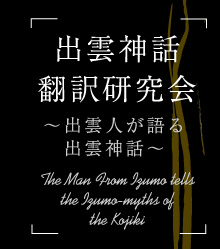葦原中国平定 “The Subjugation of Ashi-hara-no-naka-tsu-kuni”
2.天若日子 “Ame-no-waka-hiko”
Therefore Takami-musubi-no-kami and Ama-terasu-ō-mi-kami questioned to all the deities, “Ame-no-ho-hi-no-kami whom we sent to Ashi-hara-no-naka-tsu-kuni has not reported to us for a long time; whom should we send next? And Omoi-kane-no-kami answered, “Ame-no-waka-hiko, the child of Ama-tsu-kuni-tama-no-kami, should have been sent.” So providing Ame-no-waka-hiko with the Heavenly Deer-shooting Bow and the Heavenly Big-fletched Arrows, they sent him. Hereat Ame-no-waka-hiko had scarcely descended to Ashi-hara-no-naka-tsu-kuni when he married Shita-teru-hime, the daughter of Ō-kuni-nushi-no-kami. In fact he conceived a plot to usurp Ō-kuni-nushi’s land for himself, and neglected to report on his mission for 8 years.1
Therefore Ama-terasu-ō-mi-kami and Takami-musubi-no-kami asked all the deities again, “Ame-no-waka-hiko has not reported on his mission for such a long time. Whom should we send this time to ask Ame-no-waka-hiko what has made him stay there so lingeringly?” When all the deities and Omoi-kane-no-kami answered this question saying, “A pheasant called Naki-me should be sent,” Ama-terasu-ō-mi-kami and Takami-musubi-no-kami thus ordered Naki-me announcing, “Go and tell this to Ame-no-waka-hiko; ‘we sent you to Ashi-hara-no-naka-tsu-kuni so that you should subjugate the rebellious deities there. Why haven’t you reported on the mission for these 8 years?’”
Thereat Naki-me glided down from Heaven and perched on a leafy katsura tree near the gate of Ame-no-waka-hiko, and shrieked the words of the command by the Deities in Heaven the same way they spoke it. Then Ame-no-sagu-me, when she heard this bird shrieking the command, said to Ame-no-waka-hiko, “This bird’s shrieking is very bad. Shoot it dead with an arrow.” As soon as her words were spoken, Ame-no-waka-hiko shot the pheasant dead, with that heavenly bow and arrows which Ama-terasu-ō-mi-kami and Takami-musubi-no-kami provided him with. The arrow he shot at the pheasant pierced through its breast and turned its course up toward Heaven, reaching Ame-no-yasu-no-kawara where Ama-terasu-ō-mi-kami and Taka-ki-no-kami sat. This Taka-ki-no-kami is another name for Takami-musubi-no-kami. Then Taka-ki-no-kami saw the arrow, picked it up and found blood on its feathers. Here Taka-ki-no-kami said, “This arrow is the very one that we gave to Ame-no-waka-hiko,” then he showed it to every deity and announced, “If Ame-no-waka-hiko is acting as ordered, and if he intended to shoot an evil deity with this arrow, it shall not hit him; but, if he used it with evil intention, Ame-no-waka-hiko shall be cursed to destruction by this arrow!” Saying so and taking the arrow, Taka-ki-no-kami thrust it back into the hole through which it came; and it hit in the center of the breast of Ame-no-waka-hiko who was in bed in the morning, killing him. This is the origin of the saying “return-arrow”. And the pheasant did not return to Heaven, so this is the origin of the saying, “A one-way pheasant messenger.”
Thereat the wife of Ame-no-waka-hiko, Shita-teru-hime, wailed over his death and her voice, carried up on the wind, reached Heaven. When the father of Ame-no-waka-hiko in Heaven, Ama-tsu-kuni-tama-no-kami, and his son’s wife heard the wailing and knew what had happened, they descended from Heaven wailing and lamenting, and built a mourning house; then they appointed a wild goose to be a sasari-mochi, who bears food for the dead in the funeral procession; a heron a hahaki-mochi, who has a bloom for purification; a kingfisher a mike-bito, who cooks the offering dish for the dead; a sparrow an usu-me, who polishes rice in a mortar; and a pheasant a naki-me, who wailes over the dead―after assigning the roles, they sang and danced for eight days and eight nights.
On this occasion, when the father of Ame-no-waka-hiko that had descended from Heaven with his son’s wife saw a man who looked like his son coming towards them, the father and the son’s wife exclaimed with joy, “My son is not dead,” or “My master is not dead,” and they caressed the man who really was Aji-shiki-taka-hikone-no-kami, holding him by the arms or legs. They mistook Aji-shiki-taka-hikone-no-kami for their son or their master because the two deities looked very much alike. That was why they mistook him. But Aji-shiki-taka-hikone-no-kami got furious at it and said, “I came to mourn him because he was my best friend. Why did you mistake me for the filthy dead?” So saying, he drew the ten-hand-long hilted sword he was wearing and swung it down on the mourning house and cut it down, and kicked it as far away as Mo-yama, which was upstream of the Aimi River in the Mino province. The sharp sword he wore was called Ō-hakari, or Kamudo Sword. Well, Aji-shiki-taka-hikone-no-kami flew away in a rage, Taka-hime-no-mikoto (=Shita-teru-hime), his sister, sang a song so that she would announce who he was:
A Necklace made by Heavenly-weavers he slings;
A Necklace of precious stones, its precious stones flash;
He covers over two valleys dashing like the flashing of the stones;
Aji-shiki-taka-hikone-no-kami, his thunderous glory shining!
This song is Hina-buri.
Notes | 注釈
#1 Another messenger from Heavenly Deities was Ame-no-waka-hiko. In the Kojiki, he is apparently described as a traitor and was killed in the story. Both of the two deities were sent by Heavenly Deities as messenger to subjugate Ashi-hara-no-naka-tsu-kuni, but the only Ame-no-hohi-no-kami was given the name “kami” (deity) and Ame-no-waka-hiko wasn’t. That may mean that Ame-no-hohi-no-kami was still acknowledged as one of Heavenly Deities. We can say Ame-no-hohi-no-kami was given a role to keep watch on Ō-kuni-nushi-no-kami. And we can also say that these myths may represent one aspect of political strategy by Yamato government which wanted to keep a strong dominace over the Izumo World.
